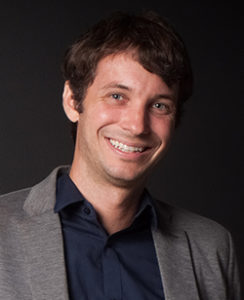
Have you ever wondered what it takes to be a composer? Picture a blank manuscript page, whether on a computer screen or old-fashioned paper, with endless sets of five lines marching across the page…empty. Now imagine filling that space with notations that define sounds, melodies, harmonies, dissonances and instrumental effects.
You must make thousands of decisions: Which instruments play when? How long is a note? How loud should it be played? How many instruments play at the same time? Will this music be fast and driving with spiky harmonies, or will it be lyrical and melodic? Will it use familiar harmonies, or will it explore new sound combinations? Is an instrument even capable of making the music you’ve written for it? Can a musician play that fast or will she end up in a twisted and tortured pile of flesh? Is there a story to the music, or is it a pure exercise in sound?
Imagine you are responsible for providing all of this musical information to 90 musicians in an orchestra, and somehow it all has to make sonic sense. Sounds pretty intimidating, right? Now you can begin to imagine the task of a composer writing for an orchestra.
Success as a composer definitely requires skill, talent, imagination, a point of view and perseverance. Then there are the factors of opportunity and luck. At least one of these factors—opportunity—is being provided by Music Director Andrés Orozco-Estrada and the Houston Symphony during the first Classical subscription concerts of this season.

After sifting through 51 outstanding scores submitted by 40 composers associated with five universities in Houston, Bogotá and Medellín, Musical Ambassador/Assistant Conductor Carlos Andrés Botero and Senior Artistic Advisor Aurelie Desmarais selected four finalists. Andrés Orozco-Estrada then chose the two winning compositions: Pathways by Benjamin Krause (Shepherd School of Music, Rice University) and El Sombrerón by Victor Agudelo (Universidad EAFIT).
The composers will each have these works performed on the first half of the opening Classical series program on September 23, 24 and 25, 2016. The second half of the program is Mahler’s Symphony No. 1—impressive company for these young composers, if a bit daunting.
“I wanted to give a chance to young composers who have been studying and working very hard to have their music performed,” says Andrés. “One of the most important things for composers is to have their music played for as many people as many times as is possible. For the Houston Symphony’s Young Composer Competition, I chose to concentrate on supporting and rewarding the work of composers in three cities that have been very
important in my musical life: Medellín, Bogotá and Houston.”
Emerging composers from five music schools in these three cities, who are currently studying or have recently completed their studies, were invited to submit scores for consideration. The schools are Pontificia Universidad Javeriana and Universidad
Nacional in Bogotá, Colombia; Universidad EAFIT in Medellín, Colombia; and, in Houston, Rice University’s Shepherd School of Music and University of Houston’s Moores School of Music. The compositions would be between six and 12 minutes in length and
make use of an orchestra no larger than is being used for Mahler’s Symphony No. 1.
Carlos Andrés Botero, who combed through thescores with Aurelie Desmarais, comments, “We were looking for pieces that are well-composed for the orchestra and have a point of view. As a young composer, you can concentrate so much on technique that the music sounds too academic. You can also be greatly influenced by music of other composers to the point your music sounds like theirs. We wanted to discover a composer who is developing his or her own voice—someone who writes original music with something fresh to say.”
Both composers will attend rehearsals as well as performances of their pieces in September. They will each receive a composition encouragement prize of $5,000 and, if the sheet music of their piece hasn’t been professionally printed, they will receive a full set of orchestra parts.
Aurelie, who works closely with the Symphony’s music director to select guest conductors, guest artists and repertoire for the Classical season, believes in the importance of performing music of today. “It’s wonderful to hear music written in this century. That it is influenced by what is happening in today’s culture can be very energizing. More and more, audiences are searching for genuine musical experiences that are relevant to them, whether the music was written in the last decade or 128 years ago, as was Mahler’s Symphony No. 1.”
Andrés will speak with both composers during the performances to learn about them and their hopes for the music the audience will hear. Although both pieces have been performed by orchestras, this will be the first time the Houston Symphony and Andrés will turn their artistry to this music. This is all in the hopes of discovering and supporting orchestral repertoire for the future. Perhaps the Houston Symphony is playing the music of the next great composer. After all, even John Adams, Igor Stravinsky and Gustav Mahler were at one time in the position of these young composers.
Join us at Jones Hall to venture into the future of orchestral music, courtesy of the winners of the first Houston Symphony Young Composer Competition, September 23, 24, 25, 2016.




As a life long classical listener, I find so-called contemporary compositions a distraction.
Please perform these scores in a separate category of concerts. This way I won’t need to sit in the lounge until the incomprehensible noise is over.